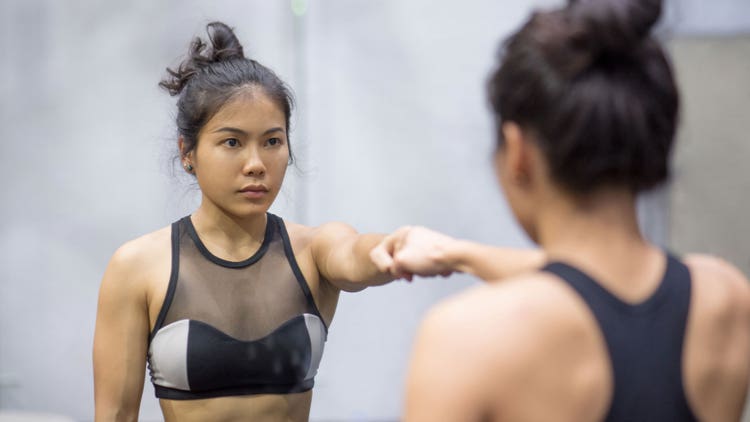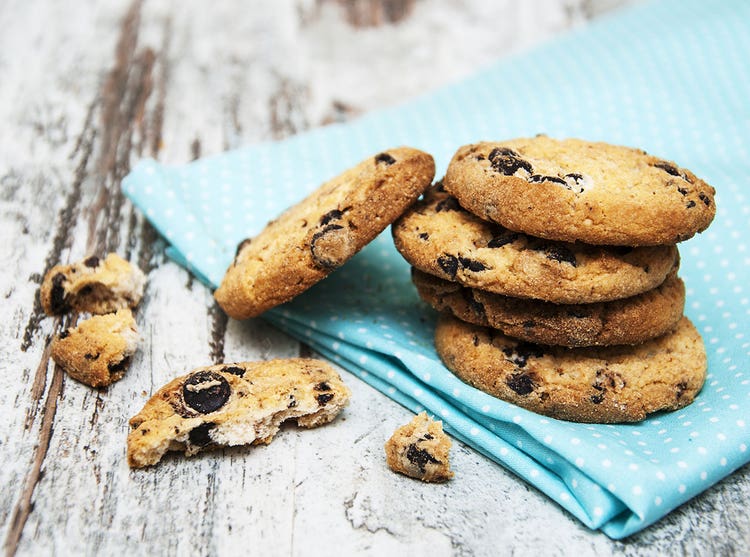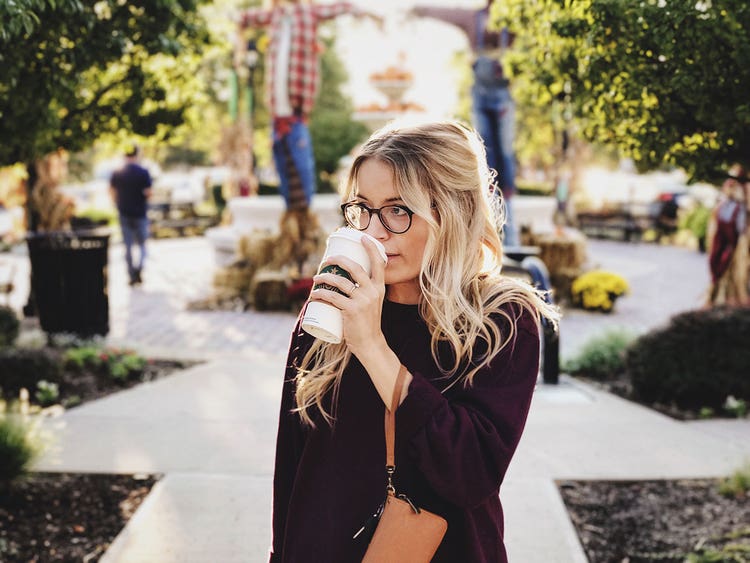24Life Editor’s Challenge: Mirror, Mirror

I grew up in the entertainment world, and as a little girl, I was constantly objectified and judged by men (and women) around me. It seemed to be the status quo, but somehow, I learned how to ignore them and stand my ground from a young age.
My first memory of an assault on my body image from my social group was the summer when I was 11. My new friend Tracey—a neighbor girl three or four years older than me—had decided to take me under her wing to show me the ways of the world. She taught me how to curl the back of my hair just right to catch a cute boy’s eye and how to make cookies, eat them and then force myself to throw them up. (Luckily for me, I didn’t have the tolerance for binge eating.)
One night, Tracy told me with great concern that her older male friends said I was cute but that I had to watch out or I would get chubby and unattractive. This devastating idea sank into my mind and landed viscerally. It was the first time that I had considered that my strong, athletic body—in constant motion thanks to gymnastics, cheerleading, tree climbing and dancing wildly to my favorite songs—could be labeled as something else. I had enough intelligence, self-esteem and self-confidence to ditch Tracy, yet it was impossible to shake the new impression that my body, identity and value in the world existed outside of me.
Early impressions last far into adulthood
New research indicates that body-image vulnerability lasts beyond adolescence, and many adults report that they do not maintain any positive perceptions arising from their physical condition or athletic competence and have lasting concern over their weight. We’ve come far in our knowledge and best practices related to health, fitness, wellness and predictors of disease. The opportunity at hand is to uncouple worth and the physical body. It’s imperative when social media pressures us to be thin and to look or dress a certain way—even if that standard is filtered, touched up and hard to attain.
The good news is that there is a growing dialogue of inclusivity and body positivity. There is excellent empirical evidence supporting the notion that exercise is a key strategy to elevate body image and self-esteem in all areas of our lives. The focus is finally shifting from how fitness makes us look aesthetically to how we can use movement and exercise to feel better and raise our vitality, engage physically with the world, and improve our psychological, physical and social well-being. In fact, “Good Health and Well-Being” for all is third on the United Nations’ list of global goals.
In this issue of 24Life
Self-image is not just about weight—it also extends to the willingness to try new things that seem out of your reach and capacity. Inspired by his admiration for bobsled athletes and the sport, Josh Williamson (our June 24Life cover story) decided on a whim to try out for a spot on “Scouting Camp: The Next Olympic Hopeful” at 24 Hour Fitness—and won! He explains that his commitment to his fitness gave him the willingness to act boldly and try out. Competing on behalf of the U.S. just six months later, Williamson is glad that he showed up, and even as he begins his career, his goal is to encourage others to raise their ambitions.
Chasing what you love feeds you along the way—you have more energy and you get braver and bolder and more in touch with who you are. Ruby Warrington, author of “Material Girl, Mystical World,” former features editor for the U.K. Sunday Times and founder of The Numinous, shares the rituals that keep her tuned into the beat of her own drum. Celebrity fitness trainer Jorge Cruise never ceases to inspire and motivate, with tips to keep it simple and keep going. And new workout moves, new understanding about how the body works, and new inspiration—from your garden to your kitchen to serving others—will take you straight into the season we all love.
Editor’s challenge: Nourish your well-being
Summer gives us fresh energy for change. How we nourish ourselves determines our energy and our vitality as well as our mindset, our emotions, and our ability to think and feel good. In fact, our consumption of some foods can border addiction, and their abuse can have a negative impact on our ability to think clearly about ourselves. That’s why this month, our challenge series continues to delve deeper into nourishment.
The goal is to get informed and intentional about how and what and why you consume food. It starts with naming your nemesis: sugar, caffeine or alcohol. If it’s not in this short list, name it and decree a 30-day discovery—and for those of you ready to do so, cease and desist consumption so you can properly evaluate that substance’s control over your body and your mind.
A note of caution: Suddenly stopping any behavior, including consuming a particular food, is challenging and will bring up a host of emotional, physical and mental experiences before you start to feel good again. If you are indeed experiencing addiction and are struggling in your life, we invite you to seek out professional help.
Sugar

The sweetness of sugar becomes sour when you can’t live without it and when you succumb to the roller-coaster experience of sugar highs and lows. The average American consumes about 20 teaspoons, or 80 grams, of sugar a day. When we eat sugar, we release opioids and the neurotransmitter dopamine, which feels like a pleasurable high that we want to repeat and re-experience over and over. Often, we’re programmed early to perceive sugar as a source of comfort and token of love and appreciation.
It’s not an easy habit to shake. Start with becoming aware of how much you are consuming, and set some boundaries around when, how much and what types of sugar you will tolerate in your life—and practice some sugar fasts or swap it out with healthier sweet options like stevia. If it feels doable and you have support, eliminate sugar and its substitutes from your diet for 30 days and see how you feel. We suspect that on the other side of this elimination, there is a sweet reward that includes, less cravings, increased pleasure of taste, and improved skin, energy and emotions.
Caffeine

For so many of us, a cup of coffee or tea or other caffeinated stimulant is the physiological jump-start we need before work or any challenging activity. It’s a socially acceptable drug of choice for meetings, family, friends and acquaintances. Caffeine is also a crutch that we lean on to keep going when perhaps our body would otherwise tell us to rest or relax.
Caffeine binds to our brains’ adenosine receptors and prevents us from feeling tired. It increases the adrenaline supply, which in turn elevates our heart rate, increases circulation and opens our airways—so we feel revved up and ready to go. As it prevents dopamine from reabsorbing into our system, we feel great—and want more to keep it going.
To take a real coffee break, create space in your life to be less productive and maybe less social, and have a replacement drink—without the stimulant—such as an herbal tea or a turmeric drink. You may experience headaches, increased irritability, mental fogginess, fatigue and even nausea and vomiting. Giving up this perky companion is no joke, and yet on the other side is freedom, increased energy, better sleep and a trust in your own clarity of mind.
Alcohol

Chances are you have heard about the annual tradition of Dry January and the positive outcomes and results a month of sobriety can bring. So why not try Dry June? True, abstaining from alcohol just as the summer festivities and happy hours begin may seem to put a damper on all the potential fun, but this is not the case.
Many rely on alcohol to mask shyness, reduce inhibitions, and to feel more comfortable and confident in social settings, and they often drink because it is simply a cultural norm or as a result of peer pressure. Some drink to toast and celebrate, and others drink to cope with depression or numb themselves to the various stressors they are experiencing in life.
Alcohol leads to an array of addictive, stressful and unhealthy conditions in life and can develop worse problems like alcoholism. If you have a drinking problem, get support. If you are a social or casual drinker and are ready to have a more conscious approach to sobriety, join us for Dry June. In just 30 days, you may benefit from improved liver function, improved energy and more willpower to abstain from drinking in social environments—along with the ability to be fully present when you are there.
Get moving
If you’re looking for alternatives to sugar, caffeine or alcohol, movement might be just the thing. You’ll likely feel energized but calm, your cravings tamed—and if you bring a friend or join a class, you’ll get your social fix. June is 24 Hour Fitness’ 35th anniversary, marking our growth from a family gym to a brand that’s committed to transforming millions of lives every day through fitness. Celebrate with a workout—you can download a free pass here.
Photo credit: zephyr_p, Adobe Stock; Es75, Adobe Stock; Caleb George, Unsplash; Kaley Dykstra, Unsplash